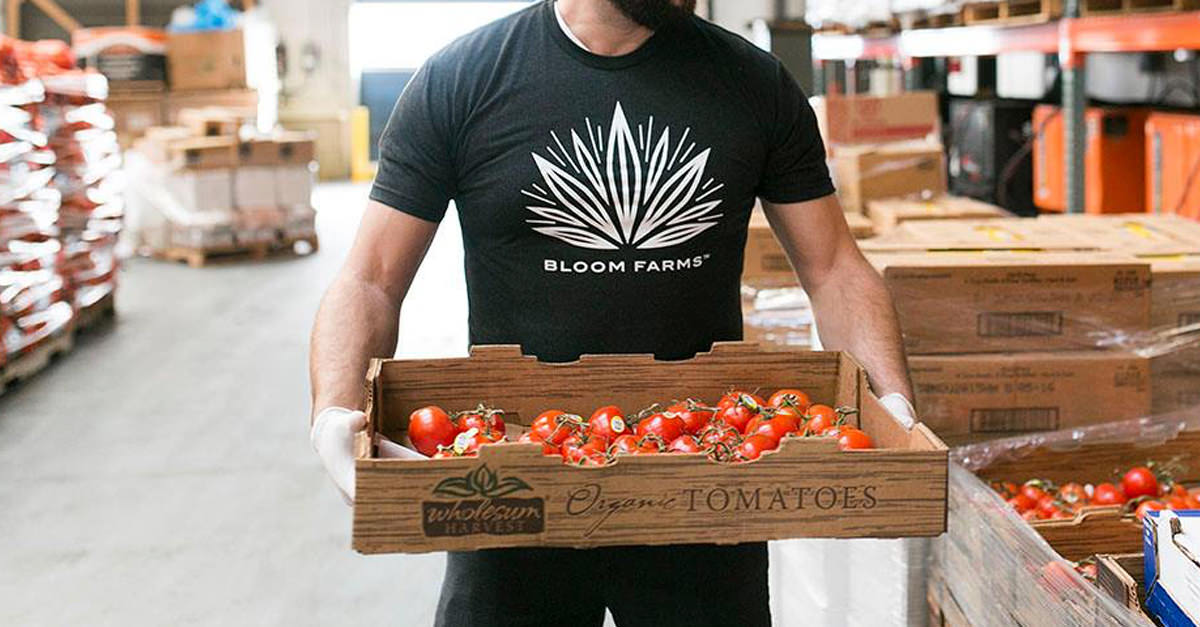With cannabis being America’s fastest growing nascent industry, “ganjapreneurs” have an opportunity to not just cash in on the green rush, but also to characterize the cannabis industry as more socially conscious than other American industries have been so far.
As an example of that, Bloom Farms, a San Francisco-based medical cannabis company, just donated its 500,000th meal to California’s nonprofit food banks. As part of Bloom Farm’s one-for-one business model, for every product Bloom Farms sells it donates money to food banks across the state to cover the cost of sourcing and distributing healthy meals.

The company carries vape oil cartridges, full vape pen sets (cartridge and battery included), pre-rolls, and cannabis oil pods. The full vape pen sets go around $50 each, while the cartridges alone cost around $30. So if you buy a $27 Bloom Farms cartridge in a dispensary, or a battery, or a full pen, that goes toward food. Since the three-year-old company launched its one-to-one program in December 2015, each product sold has been equivalent to about one healthy meal.
True corporate responsibility means investing not only for the sake of the businesses’ success, but also for the sake of social good, says Bloom Farms CEO Michael Ray. “I think that many successful businesses in emerging industries are starting to realize that this is the way things should be going,” he tells Jane Street. “It’s kind of a capitalism 2.0, we need to take better care of the people around us, it’s not all about profit.”
Some cannabis companies like Jetty Extracts donate free medicine to people in need, while others have their staff participate in volunteer work like beach cleanup. Ray says he was in part inspired by companies like Toms, a shoe company with a one-to-one charity model, and Warby Parker, which also makes donations with every purchase.

“Especially with adult use legalization popping up around the country, I think now is as good a time as any to really put our best foot forward as an industry,” Ray says. “It also moves away from what people have been talking about for the past several years, the green rush and getting rich quick, all of which I don’t find to be true at all.”
According to the California Association for Food Banks, more than 5.4 million California residents, including 2.1 million children, risk going to bed hungry each night. Ray witnessed the state’s hunger crisis as a child, growing up in Calaveras County outside Sacramento, where hungry friends would come over for home-cooked meals. “Back then we were simply having my friends over for dinner, but I didn’t realize the severity of the situation until I got a little older and saw the statistics that say one in eight Californians don’t know their next meal is coming from,” says Ray.
Bloom Farms also offers its staffers paid volunteer time each month. Many of them dedicate their time to one of Bloom Farm’s partner food banks, such as World Harvest LA Food Bank or SF-Marin Food Bank. Bloom Farms aims to to reach a million donated meals by Thanksgiving of this year.
Ray says the cannabis industry should be treated no differently than any other industry, but there’s still nonetheless stigma surrounding cannabis that charitable efforts can help counteract. “Corporate social responsibility is our ticket to changing perceptions about what we do,” Ray wrote in MG Magazine. “Corporate social responsibility is our way of healing the planet, not just our patients. Corporate social responsibility can no longer be a second thought.”





